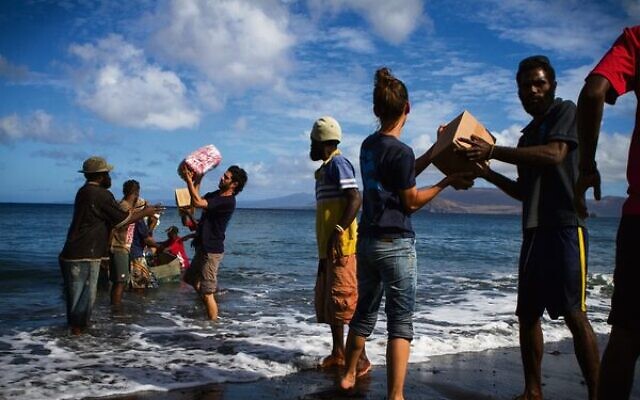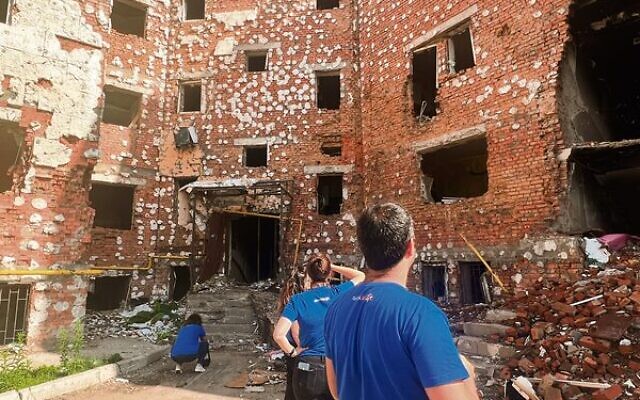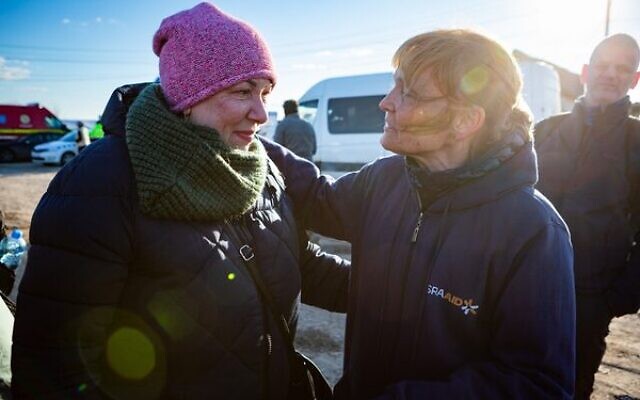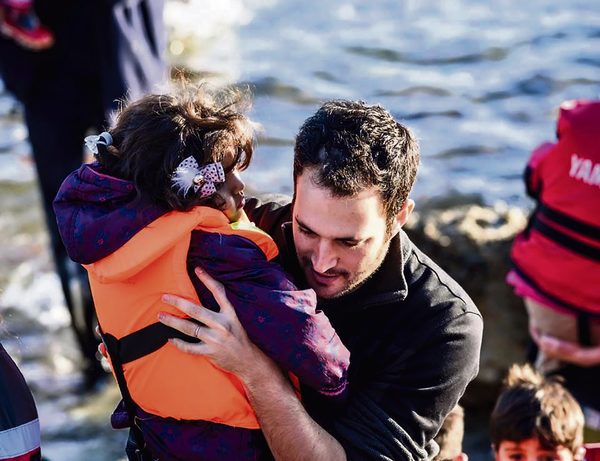Expressing excitement about his first visit to Australia at a boardroom lunch in Sydney late last year, Yotam Polizer quipped, “Usually I go to all these places that people are running away from.”
Polizer is the CEO of IsraAID, a not-for-profit organisation that provides ongoing disaster relief and rebuilding support around the globe. He will return to Australia to open its first office in Australia this month.
At a New York ceremony in May, Polizer was presented with the Charles Bronfman Prize, a prestigious award presented annually to a humanitarian whose work, informed by Jewish values, has significantly impacted the world. At the award ceremony, he announced the organisation’s new strategic growth plan to double its budget to $US50 million over the next five years – donating half his prize money of $US100,000 towards this goal – and mainstream climate resilience into everything it does.
Polizer first joined IsraAID as a volunteer in 2011, leading the organisation’s relief mission to Japan after the 2011 earthquake and tsunami that left 20,000 people dead. He soon became the organisation’s second full-time employee, leading emergency missions to the Philippines after Typhoon Haiyan, Sierra Leone during the 2014 Ebola crisis, Nepal following the 2015 earthquake, and Greece and Germany during the 2015 Mediterranean Refugee Crisis, before becoming co-CEO in 2017 and global CEO in 2019.
In the meantime, IsraAID has grown to 320 staffers and helped in 50 countries. It has a team of 30 on the ground in Ukraine, as well as staff in South Sudan helping victims of gender-motivated violence. It has worked in Greece and elsewhere helping Syrian refugees, in Washington state after a 2014 wildfire, in Mozambique after the 2019 cyclone and in many more locations.

Addressing the Sydney lunch, Polizer recalled having an epiphany when in Japan in 2011.
“The Japanese, as some of you are well aware, are very organised,” he said. “They were all telling us when we came and offered support, ‘It’s okay, we’re fine.’”
Still, the IsraAID team went to a kindergarten that had lost eight children in the disaster and did an art-therapy activity based on what has been done with kids in the Israeli town of Sderot, in the Gaza envelope, to help them cope with rockets.
Polizer said when the Japanese teachers saw the kids’ drawings “they were shocked”.
“They said it’s literally the first time the kids actually expressed themselves and they realised the trauma that they were going through. So then they came to us and asked to learn from the Israeli expertise in helping to cope with trauma. We have so much know-how that we can share,” he said.
“Before that we were responding to disasters, and we were pulling people out of the rubble … but Japan was the first time that we realised we need to do long-term work.
“It’s great to be first on the ground. It’s very important but it’s even more important to be the last one to leave, and to help people with long-term recovery and resilience.”
A few years later, in September 2014, he found himself in Sierra Leone during the Ebola outbreak.
“When I arrived, the survival rate was 50 per cent. I was literally terrified,” he said.
“Every night I used to wake up full of sweat, which is one of the symptoms of Ebola, and I was 100 per cent sure that I had the virus.”
Sierra Leone being one of the poorest countries in the world, he explained that one of the main causes of infection was unsafe burials in the Muslim community.
“So an Israeli organisation was working with Muslim imams to help them find a religiously sensitive, appropriate way to bury the people who died from Ebola without touching them,” he said.
“We were able to stop the spread of Ebola way before they had a vaccine.”
“It’s great to be first on the ground. It’s very important but it’s even more important to be the last one to leave, and to help people with long-term recovery and resilience.”
Following Sierra Leone, Polizer said his hopes of taking much-needed time off were thwarted by the 2015 Nepal earthquake. He knew the country well, having trekked through the Himalayas and volunteered helping street kids there following his army service.
Upon arriving, the IsraAID team was assigned to a collapsed building which the Nepalese Army said had 22 people buried under the rubble. After two days they had pulled out 21 bodies.
“They told us there was one woman whose name was Krishna Kumari. She was 35 years old. And she was the only one that we didn’t find. So we kept on drilling,” he said.
On the sixth day, using a “life detector” device that uses a sensitive microphone and seismic sensor to detect movement, heartbeats or breathing, the team commander said he heard something.
“Because he knew I spoke the language, he asked me to crawl into this hole and scream something in Nepalese. When I reached the deepest part, about 50 metres deep into this hole, I screamed, ‘Excuse me, is there anybody in there,’” Polizer recalled.
“And this person was actually able to make a sound, a voice, and she was whispering, ‘It hurts, I’m in pain.’ She survived for six days without food or water. She was the last survivor of the earthquake.”
As “things were settling down in Nepal”, Polizer said, “Another massive crisis happened in the Middle East,” referring to the hordes of refugees fleeing the Syrian civil war to places such as Turkey and Greece.

“The first people who welcomed them or provided them with medical support, were a group of Israelis. Our organisation is called IsraAID and we have the Star of David, so it’s pretty clear where we’re from,” he said.
“So we always joke that these people probably think they took the wrong boat.”
Half of the team were Arab Israelis – Druze, Bedouins, Christians and Muslims working in hospitals in Israel, recruited for the mission because they could speak Arabic.
In December 2015, the IsraAID team rescued passengers from a refugee boat that had capsized offshore. Polizer himself carried a young Syrian girl of only four or five years of age out of the water; she was treated by doctors for hypothermia and then stabilised.
“Her father was shocked,” he recalled. “Obviously, it’s the first time he’s seen an Israeli or Jewish person in his life.
“And he told me something I always quote. He said, ‘My worst enemy became my biggest supporter and the people who are supposed to protect me back home in Syria, are chasing me away.’
“It really was the first time that I realised what an opportunity we have here, not only to save lives – which is our core mission – but also to build bridges and change people’s perspectives.”
Polizer recalled speaking to Jewish university students in North America, where anti-Israel perspectives and support for Israel boycotts are rife.
“The younger generation is shifting away from Israel in some places in a very sad and extreme way. And so I really do see how our work could build these bridges,” he said.
“I personally spoke at like 55 campuses, including places that are considered the most pro-BDS. The students were lining up asking how they can volunteer and how they can interact with us.”
Conceding the not-for-profit could do with more ambassadors, Polizer cited actor and humanitarian Sean Penn, who praised IsraAID after working with the organisation in Haiti after the earthquake.
“He was quoted that everything he learned about humanitarian aid, he learned from IsraAID,” Polizer said.
He said IsraAID has also worked in a number of countries that do not have diplomatic relations with Israel, including Indonesia, Bangladesh, Iran and Iraq.
“We have a lot of people on our team who have dual citizenships,” he explained, adding that while working in these countries the team is careful not to display any Israeli symbols.
“But the local community and the local groups are actually almost 99.9 per cent of the times are very, very positive.”
A new Israeli diplomatic relationship become central to the effort in 2021, when helping a group of Afghani girls flee the country following the takeover and return of the Taliban.
Polizer explained that he received two phone calls – one from a British-Israeli New York Times journalist who had written about the first Afghan girls robotics team, and another from an Israeli-Canadian philanthropist who was supporting the first Afghan girls cycling team. Both groups were being threatened by the Taliban because of their activities.
“I realised what an opportunity we have here, not only to save lives – which is our core mission – but also to build bridges and change people’s perspectives.”
What followed, he said, was a “James Bond type of operation” to help the women over the border.
“At some point, we found out that 41 of them didn’t have passports,” he added. Polizer then contacted the ex-wife of former US ambassador and MK Michael Oren, who was friends with the wife of the Afghan ambassador in Washington at the time Oren served there. This got the IsraAID team in touch with the Afghan ambassador, who was at that point in Moscow.
“He was not representing the Taliban, but he had a lot of passports. We call him the ‘Afghan Sugihara’. He started to print passports for these Afghans,” Polizer said.
“We got them across the border and then we arranged charter planes for them. And we needed a country to take them. So who do we contact? Our new best friends, the United Arab Emirates.”
He said the request went all the way to Crown Prince Mohammed bin Zayed.
“When he heard there was an Israeli group trying to rescue Afghan girls, he immediately said, ‘We’ll take them.’ The first person who tweeted about it was the deputy foreign minister of the United Arab Emirates. He called it the first humanitarian mission of the Abraham Accords.”
Around 50 per cent of IsraAID’s funding, Polizer said, comes from Jewish donors around the world. Some funding also comes from the corporate sector. A surprising funding source is the United Nations.
“They have huge budgets, and they’re looking for implementing partners to do programs around water and sanitation or around children’s education. So we get quite a lot of funding from UN sources for projects in Sub-Saharan Africa and in Latin America,” he said.
“The sad reality is the government of Israel have cut their budget for humanitarian aid and development. There are exceptions when the government do send the IDF, and that’s when they do a big investment and that’s amazing. And when they do, we partner with them.
“The most famous story I think is in Haiti, when the IDF sent a field hospital. So we sent our team with them. And they had to leave after two weeks because they have other important work to do in Israel, and we took over.”
Polizer said the best way to know that IsraAID’s programs are effective is “how the community responds when the next crisis hits”.
“There’s also these very sad statistics, that 97 per cent of funding in humanitarian aid goes to disaster response and three per cent to preparedness for the next disaster,” he said.
“So we say okay, that’s just what it is. This is the reality. Let’s use the response funding to help communities prepare for the next disaster.”
Asked about how the COVID-19 pandemic affected the organisation’s efforts, Polizer said, “A lot of our work is based on jumping on planes and getting to these areas. And we couldn’t do that.
“But that’s again when this long-term strategy proved to be extremely helpful, because we had teams on the ground in 15 countries. So the teams that we trained in each of the countries, most of them are local staff, they were able to respond to COVID.
“So we did big vaccination, sanitation [initiatives], some of the Syrian refugees that we trained were actually producing masks.
“It ended up being a very good stamp of approval for our strategy of building local capacity.”

Now firmly embedded in Ukraine, Polizer said IsraAID is “now operating the biggest humanitarian operation that we ever had”.
Following a meeting with Ukrainian first lady Olena Zelenska, who expressed the importance of offering trauma support and learning from Israel, IsraAID has hired 60 psychologists to provide training and psychological support across the country, again based on the Israeli Sderot model.
“These are centres where children can actually be children for the first time in many months,” Polizer said.
“So we are in Ukraine and we will continue to be there for the next five years.”
He again stressed the importance of not just being the first in, but “that we’re the last one to leave”.
“We understand that the recovery will take years. So we’ll be there to work side by side with the Ukrainian people,” he said.
“A lot of our team members are Jewish Ukrainian, but our work is not just with Jewish people. Our work is supporting the most vulnerable. So we’ll be there side by side as long as they’re needed. And that’s what we’ll continue doing around the world.”
For more information: israaid.org


comments